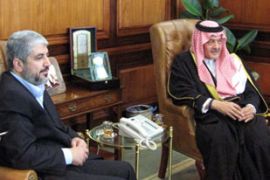Palestinian reconciliation ‘close’
Hamas and Fatah in “final stages” of agreeing Egypt-brokered deal, Hamas official says.

The two groups have been at odds since Hamas seized full control of the Gaza Strip in 2007 after pushing out security forces loyal to Mahmoud Abbas, the Palestinian president and Fatah leader.
Saudi role
Meshaal was meeting Saud al-Faisal, the Saudi foreign minister, to help with the reconciliation process, Saudi officials said.
|
“We want this document to conform to what we have agreed with our brothers in Fatah and the other Palestinian organisations” Khaled Meshaal, |
“We still hope that the kingdom plays a special role alongside Egypt and Arab countries to help us first succeed in sponsoring the Palestinian reconciliation and unify the Palestinian position and also to prompt Arabs to confront the stubborn Israeli administration,” Meshaal said.
Egypt has already twice postponed the planned signing of the reconciliation agreement in Cairo because of continuing differences between Hamas and Fatah.
“We want this document to conform to what we have agreed with our brothers in Fatah and the other Palestinian organisations,” Meshaal said.
“We will then be ready to sign it in Cairo, with the others.”
Azzam al-Ahmad, a senior Fatah official, said Fatah has already endorsed the Egyptian proposal and it was up to Hamas to decide what happened next.
“We urge Hamas to sign it so that we begin implementing the agreement,” Azzam al-Ahmad, a senior Fatah official, told the Reuters news agency.
Gaza reconstruction
Agreement between the two Palestinian factions is vital for the reconstruction of the Gaza Strip, left in ruins by Israel’s 22-day offensive, launched in December 2008, that killed more than 1,400 Palestinians and 13 Israelis.
International donors pledged $4.5bn to the Palestinian Authority at a conference in the Egyptian resort town of Sharm el-Sheikh in March, the bulk of which was to be used for the reconstruction of Gaza.
But many donor countries refused to channel their funds via Hamas, insisting Abbas’s government must supervise the spending.
Hamas won the last Palestinian parliamentary elections in January 2006 and formed a government that March. However, the cabinet was boycotted by Israel and the West over the group’s refusal to renounce violence and recognise Israel and past peace deals.
Tensions between Hamas and Fatah grew for months afterwards, often erupting into violent clashes, but the two sides managed to form a unity government in March 2007 after Saudi mediation.
But the unity government was shortlived and the government unravelled following Hamas’s move against Abbas’s security forces in Gaza.